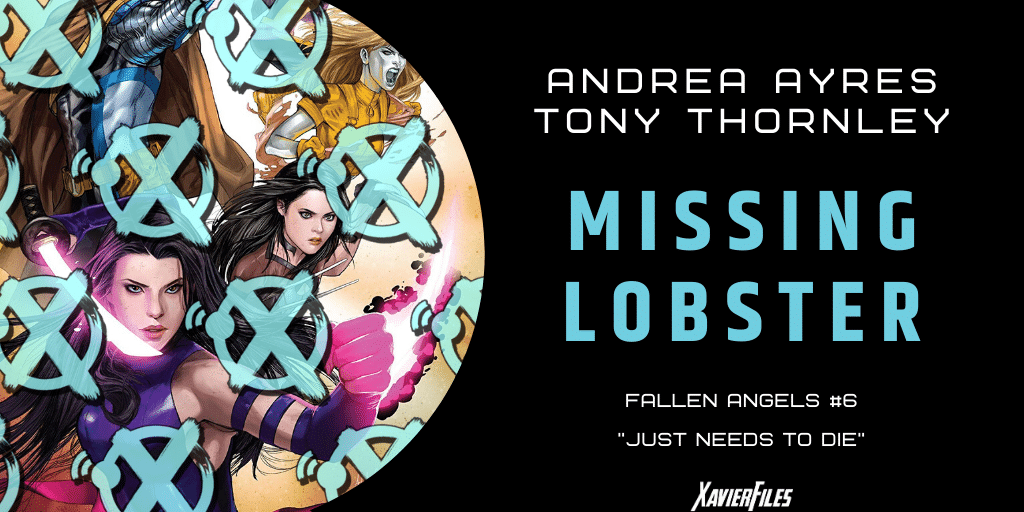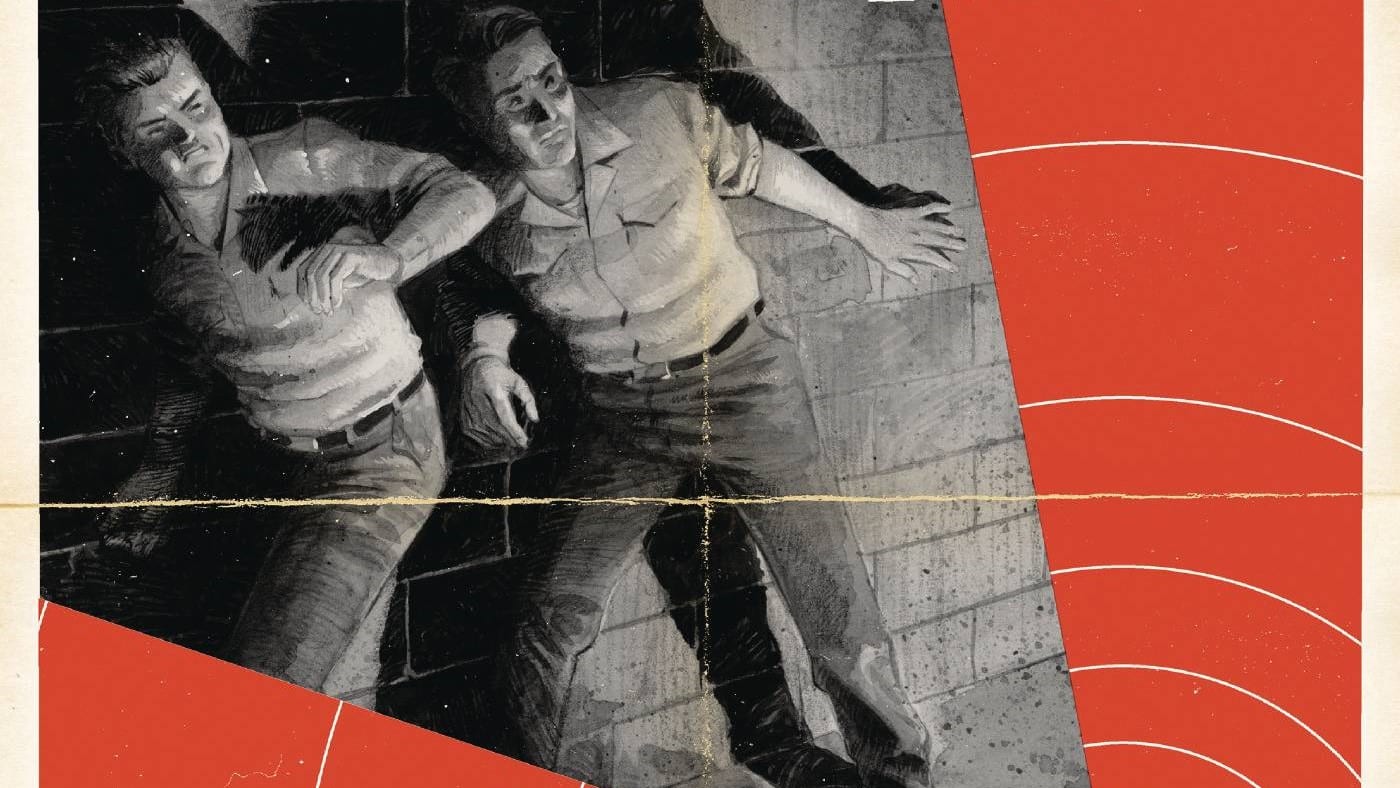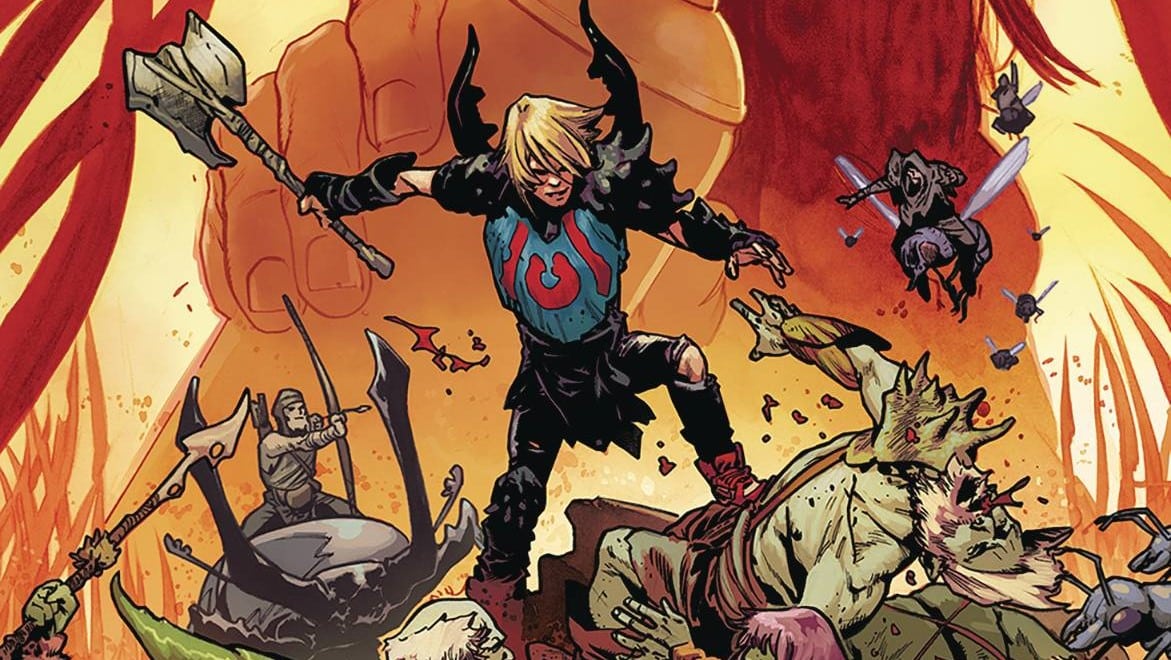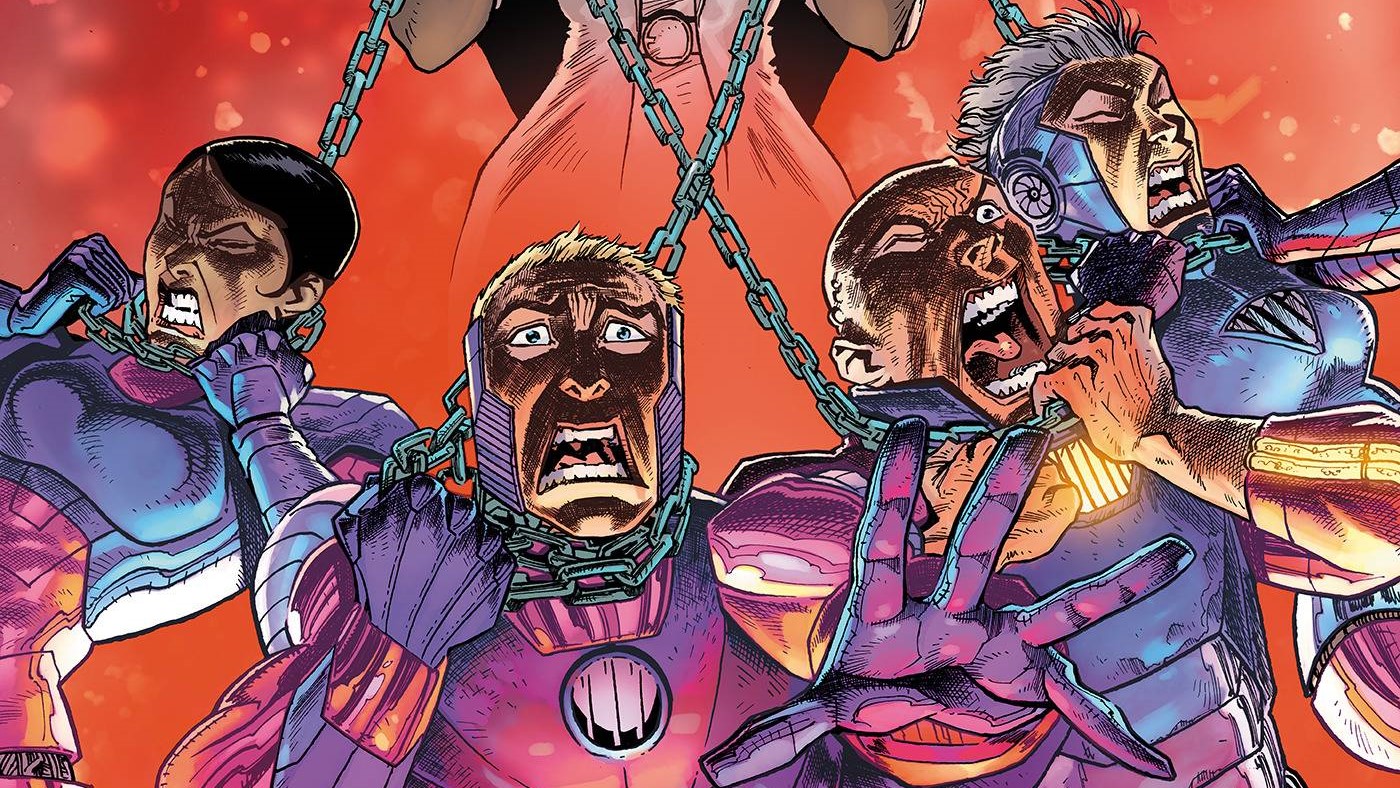The finale is here. Psylocke gets a brand new power. X-23 and the rest of the squad take on Apoth and his children, who will prevail? As Bryan Hill, Szymon Kudranski, and Frank D’Armata return once more to close out this series.
Tony Thornley: This issue picks up en media res. The team is mid-battle and to say it’s chaos is putting it lightly.
Andrea Ayres: Not before we get a maudlin monologue from Psylocke, of course. It opens with one of the most grating lines for me, but I’ll get to that in a bit. Back to the battle sequence on page six.
Final Battles

TT: No kidding. So this issue is just rush city. It feels like about 3 issues of plot, jammed into one, and it’s no more readily apparent than the opening fight scene. Things are jumbled, they’re chaotic, there’s words getting yelled that I’m not even sure what the point of them are…
AA: I’m happy to know that the entire Fallen Angels series appears to predicated upon teaching logical fallacies 101. The children are innocent, so you can’t hurt them. Why? Because they are innocent. Writing is simple when you don’t have to do the work of explaining anything.
TT: You’re exactly right. But that does not land at all. Why? Because we do not see the Overclock possessed figures at all. We see silhouettes from a distance. We see feet. We see flailing limbs as Cable, Husk, Bling! and Laura punch them. But never once do we see a full-figured Overclock zombie. We don’t know if they’re male, female, child, adult, brown, white, black… Hill is trying to add emotional stakes here, which I admire, but Kudranski and D’Armata’s art completely fails at conveying that. It becomes just a superhero beat-em-up with no stakes.
AA: Tony yes. One thing I’ll say about Hill and emotional stakes is this, what is their purpose here aside from providing the reader with a false sense of depth? I don’t see any of the themes, like what Overlock was purported to represent, to be connected to much in this finale. The art and coloring fail to convey action, spirit, momentum. It feels exactly as you say, like a superhero beat-em-up, that’s the perfect description.
TT: Exactly, and without those stakes, it crosses a line into bland. It also doesn’t help that there’s very little logical consistency here, which we’ll get into shortly.
AA: Each component of this story feels unmoored and I find Psylocke’s self-pitying tone throughout the issue to be absolutely jarring, especially placed next to the battle. We’re supposed to be in a battle against Apoth, a self-ascribed god, but Psylocke is going to waste her time lamenting? Let’s not forget her basically telling Laura ‘oh you are fine, the squad never needed me anyway.’ Like Laura hasn’t done the work to at the very least understand she has some intrinsic value and agency? Spare me. I really don’t have sympathy for the laziness with which this finale was put together and I find it almost insulting.
TT: Know what though, Laura totally rocked without her. She felt more like the character we love than she has the previous five issues. I WANT Laura the leader in Dawn of X again, and soon. I’m really glad to see that Hill evolved in his depiction of her, and that sliver of hope does help with the issue. However, it’s just a sliver, isn’t it? Joining the story en media res actually does it a disservice.
AA: As we join our team already in battle, it is nice to know that we don’t have to worry about pesky little things like understanding specifics! It’s a choose your own chaos!
Everyone Hates Moral Philosophy Professors

[page 14]
AA: There has been a part of Fallen Angels that’s lodged itself under my skin. It’s around this concept that there can only be room for one. There’s only room for one kind of good, one kind of redemption story, one strong woman. It’s all presented as binary, which obviously is kind of the point of the series, right? It’s presented as the reason why Apoth exists. It’s why we get one of my least-favorite cringe-worthy pieces of comics panel I’ve seen in a hot second.
TT: That’s been the big problem with the series as a whole. It’s all about creating Psylocke as a character of her own, yet it’s come at the expense of literally everything else. Hell, Husk and Bling! have no more than two lines this entire issue.
AA: The problem with the whole gambit with which Fallen Angels rests on, I think, is that it’s trying to be too clever by half. I think the idea here is Apoth believes in binary systems and the entire struggle is to show us that there is no such thing. Of course, Hill never really accomplishes this goal. I guess to explain what I mean, we can take an example.
On page five, Psylocke exclaims how everything she touches withers..everything she loves dies. She then goes on to say, “Elizabeth kept the righteousness. And left me as the shell.”
Here, Psylocke engages in the cognitive distortion of all or nothing thinking. The binary. Could Hill have known this Tony?
TT: I really don’t know, but you point out what bothers me about Psylocke’s journey. This book really should be about shades of grey. There is so much here that points to deeper ethical and moral quandaries about not just superheroes, but human existence.
AA: I guess my bigger quibble is that we never get to dive into the system of ethics, morals, and values that has informed Fallen Angels. If these Angels have indeed fallen than they have done so on the basis of someone or something’s moral or ethical code. As the reader, we never really know what the heck that is?! That’s a problem for me.
TT: Exactly. Now I’m not looking for a comics equivalent of The Good Place, and debate on stuff like moral dessert, Kant, or the Trolley Problem. But this story is based on the shades of grey, which in my mind is the root of the name Fallen Angels. These are still “divine” beings, however, they have broken the laws of God, and fallen from his presence. But do we actually see that here? No, we see Psylocke turning into a butterfly, and the X-kids debating harming innocents, while throwing phosphorus flares, using live ammo, and shooting that one guy because he said it’s okay but not for any of the other victims and… The narration seems to be setting up a debate about good and evil and existing in-between, but we never get there.
AA: Always here for a Good Place reference. You are right, that’s the crux of it. We never get there. I also can’t stop thinking about what and who gets to define what good is? No one is good all the time. No one is righteous all the time.
Room For One

AA: There’s one idea presented in FA that Psylocke is grappling with being a hero even though she isn’t ‘good.’ It’s so much more than that though. It’s a core belief that her lack of goodness causes what she loves to die, causes what she touches to wither. This feels almost puritanical. That Psylocke has not lived up to whatever system of goodness informs this world, that she has failed in some regard, by some standard; means she is damned. It’s even more note, but lord we don’t have the time to get into it here, that as a kind of failed mother, she is somehow relegated to this position of the damned. As the reader, we don’t come from a position of being able to examine or understand the system of ethics and values that tells us how to define good or bad. I can’t help but feel like FA is informed by the patriarchal worldview that’s helped inform the western liberal philosophy of what is goodness, morality, and justice.
TT: And I have to repeat what you’re saying here- these standards are never applied to men. Psylocke is framed as the binary evil almost exclusively because of her failings as a woman. If Cable was the lead character here, or Wolverine, or Havok, THIS WOULD NOT BE HAPPENING. This plotline is exclusively because Psylocke is a woman.
AA: OMG YAHS. Tony. As a woman, you must care and provide care. This is your duty and obligation. Not only must you care but you must be seen caring. Society frequently judges women on the good deeds they do for others. How good are you? Let me see. Prove it. Because goodness in the western liberal tradition operates from the position of the masculine as neutral as the baseline for goodship than in order for Psylocke to be good she must denigrate herself. In essence, the only way for Psylocke to be good is to be against herself.[Ed. note: See Robinson, Jenefer, and Stephanie Ross. “Women, Morality, and Fiction.” Hypatia, vol. 5, no. 2, 1990, pp. 76–90]
TT: And not only that, it implies that to be good, she needs to actively reject everything that has got her to this point, literally represented by Apoth taking the form of her mentor (aka father figure), lover, and daughter. It’s a heavily gendered approach, that, just like you said, would not have happened to a male character. Even worse though- Psylocke then has to kill Apoth in that form.
AA: Morality is presented throughout Fallen Angels as if it is a system of prescriptive rules which can be easily applied. It’s the John Rawls “The Original Position” approach to comics writing.[Ed. note: See Matsuda, Mari J. “Liberal Jurisprudence and Abstracted Visions of Human Nature: A Feminist Critique of] Rawls seems to indicate rationality is a precursor to performing good deeds. His theory also suggests that being emotionally disinterested is an important component of this, aka Rawls’ ‘economic man.’
With Fallen Angels, as in Rawls’s work, we’re dealing with abstract theories of justice, goodness, and morality. This is done, in both instances, to keep the reader from questioning too deeply the arguments being portrayed. This even plays out in the artwork. We see this play out in the orientation of the reader in the panel. We’re often hovering over the action, enabling both writer and the artist to never have to prove their argument which appears to be: If we are damaged, we cannot do good unless we transform.
TT: Hence the “Psylocke is a psychic butterfly” splash page right before the big villain fight. She’s clearly framed as something evil until she transforms into something beautiful (putting aside the fact that classically PSYLOCKE DOES NOT HAVE TELEKINESIS).
AA: I just clapped at my desk, if by desk you mean the Starbucks I work from. The butterfly metamorphosis is gunna get me on a totally different train but here’s what I’ll say about it. I’m not here for it. Do you know how faulty a line of thinking it is to believe that the only way we can change, or access our power as damaged persons is by some kind of magical transformation? It totally destroys her agency in numerous ways. First, the implication here is her power is the result of her teacher and that’s been implied through the entire series.
Pain like failure clawing at me. Whispering. You’re not strong enough, it says. Fight the pain with love. Fly. Fight it with rage. But fight. Fly.
Also, why does Hill need to undermine the message of fighting pain with love with the second part about fighting with rage?
Then we have the second bit that drives me up the wall which is when Psylocke says she doesn’t deserve mercy. People who have experienced trauma deserve mercy. People who are damaged can change and that change doesn’t have to be magical, it doesn’t have to come from an outside source. I have waited my entire life for the absolution of perfection, believing that when I reach this impossible objective, I will be fixed. I will be good enough for the world, for myself. Then and only then can I be the person I want to be, do the good I want to do. That’s not how it works but you wouldn’t know that reading this comic.
TT: Going back to what we were saying before: Be the good you want to see in the world. I know it’s corny to say in the middle of a discussion of a superhero punch-em-up. However, it was 100% unnecessary for Psylocke to have a magical transformation right before she punched the evil robot in the face. It would have been much more meaningful if it had simply been about her determination to change, and be better. The butterfly page could have even stayed, continuity be damned, if the narration had been more about a personal determination to be doing something to benefit the world. Not this.
AA: The transformation bit also further gives credence to the faulty system at work in this issue that there’s only for one kind of good, or strong, or righteous. Then there’s that of absolutely ridiculous squabbling that occurs between Laura and Psylocke or the weird way in which Psylocke is like ‘Hey, I’m busy fighting a god here.’ It feels so unnecessarily condescending and I can’t understand why. Tony, I know you have feelings about this and I beg of you to tell me them. Please.
TT: Not only that, it comes as Psylocke is also congratulating Laura for coming into her own (which once again, All New Wolverine erasure). I have to say… I kind of enjoy that Laura seems to say “forget this” and mostly acts like herself for the entire issue. This is the Wolverine again, the confident young woman who not only embraced her father’s legacy but moved past it. We see a glimmer of what could have been with Laura Kinney here, and I really truly hope it gets followed up on in her upcoming appearances in X-Men.
AA: Yes. I too enjoyed that she was like “alright, you do you Psylocke, I’ll just fix everything here…”
TT: Exactly, and though it wasn’t perfect, she rocked it. It was a glimpse into a very different series that could have been. But then we shift to Psylocke, the black and white killer who in the end has made virtually no distinguishable character growth in the last six issues.
AA: The messages of FA all seem to exist in the abstract because that’s easy, it only advantages Hill and his message. In the same way Rawls uses abstraction to prove his own theory of justice.
The person behind the idea of what doing good means, who gets redemption, who is and isn’t ‘fallen’ is Hill. I never heard Psylocke’s voice in FA. I never believed it her talking. I could only hear Hill talking through her. The final page ends with Psylocke saying she did a good a thing, that she can do good. This page should give us a sense of closure. Instead, it’s empty.
TT: All that said, the issue was once again an improvement on the previous. The art didn’t have any glaring anatomy problems or even push too far into weird territory. This was just a deeply flawed series, with issues that probably shouldn’t have happened.
AA: I have less than charitable opinions about the art or the idea that any part of this was an improvement. I guess, the only element I’m grateful for in this issue is Laura’s persistence and her willingness to help Psylocke despite being given every opportunity to turn her back. I wish this dynamic would have been explored. I wish a lot could have happened. At least it’s over.
X-Traneous Thoughts

- Psylocke and Sinister are going to be an interesting dynamic to follow into Hellions.
- I really don’t understand how Apoth was defeated or what the being that came after was
- Husk and Bling! deserved better
- I guess Psylocke and Laura are friends now?
- We’re all butterflies now. (pg 26)
- Make sure to follow Andrea as we cover X-Men/Fantastic Four and Tony on Wolverine
Andrea Ayres writes about comics and culture. She loves research, coffee, and lifting weights.
Tony Thornley is a geek dad, blogger, Spider-Man and Superman aficionado, X-Men guru, autism daddy, amateur novelist, and all around awesome guy. He’s also very humble.







